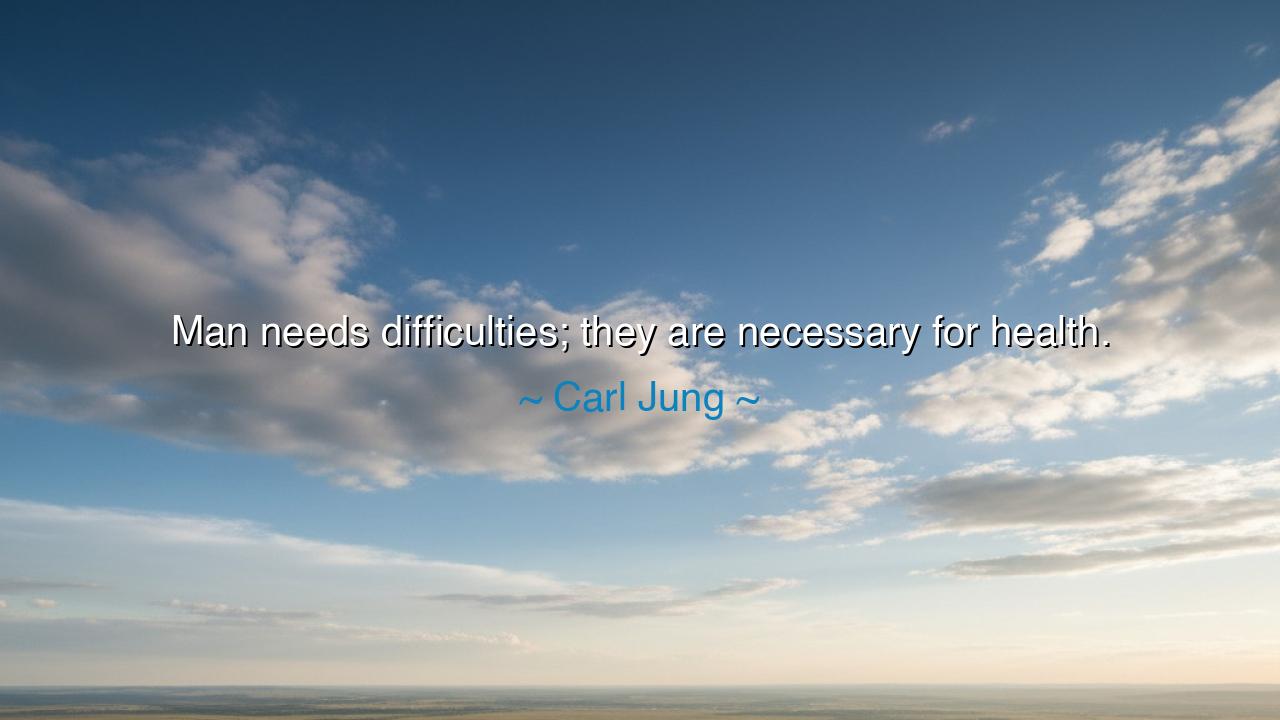
Man needs difficulties; they are necessary for health.






The words of Carl Jung, “Man needs difficulties; they are necessary for health,” strike like a hammer upon the anvil of the human soul. In them, Jung does not glorify suffering, but reveals a profound truth about the nature of growth — that struggle is the forge in which strength, wisdom, and wholeness are made. He teaches that without challenge, the spirit stagnates; without resistance, the muscles of the mind and heart decay. Just as the body requires exertion to remain strong, the soul requires adversity to remain alive. To be too comfortable is to grow weak, and to flee hardship is to flee one’s own becoming.
The origin of this quote lies deep within Jung’s philosophy of the psyche, which sought to reconcile the visible and invisible forces within man. As one of the founders of analytical psychology, Jung believed that health — both mental and spiritual — arises from balance, from the conscious and unconscious learning to coexist. Yet such harmony cannot come easily. It demands that a man confront his shadow, the darker half of himself, and walk through the fires of inner conflict. In this sense, “difficulties” are not external burdens alone, but the very material of transformation. For Jung, health was not the absence of struggle, but the ability to endure it, integrate it, and emerge more whole.
He knew that in ease, the human spirit drifts into illusion. Without resistance, character softens; without pain, compassion cannot bloom. Nature itself bears witness to this law. The oak becomes mighty not because the wind spares it, but because the wind tests it. The butterfly’s wings gain strength only through the effort of breaking free from its cocoon. So it is with the human heart — to deny struggle is to deny life’s design. Jung’s insight, therefore, is not a counsel of despair, but of hope: for he tells us that difficulties are not curses, but catalysts — sacred messengers sent to awaken dormant power within us.
History offers countless mirrors of this truth. Consider the life of Nelson Mandela, who endured twenty-seven years in prison, confined, humiliated, and isolated. Yet from that long darkness emerged not bitterness, but peace — not weakness, but moral greatness. The suffering that could have destroyed him instead refined him, shaping his soul into a vessel of forgiveness and strength. He himself later said that the cell in Robben Island was his “university of life.” Through difficulty, he became free — not merely from prison, but from the chains of hatred. Mandela’s journey embodies Jung’s teaching: that adversity, when met with courage and reflection, is the crucible of true health — the health of the soul.
Jung also warned that societies, like individuals, grow sick when they eliminate all challenge. A civilization obsessed with comfort and convenience becomes spiritually anemic. The ancient Stoics understood this well. They practiced voluntary hardship — fasting, endurance, simplicity — not out of misery, but to keep the will alive. They knew that man must meet friction if he is to remain real. Likewise, Jung cautioned that the modern pursuit of ease blinds us to our deeper needs: we grow through opposition, not through indulgence. The man who never faces difficulty remains a child in spirit, for it is struggle that initiates the soul into maturity.
This truth is not meant to glorify pain, but to redeem it. For even in the midst of suffering, there is meaning. Jung taught that when we face hardship consciously — with patience, courage, and reflection — the wound becomes a teacher. The trials of life invite us to discover our inner resources: faith, resilience, creativity, and grace. Without the weight of struggle, these virtues remain dormant. To suffer without reflection is to break; but to suffer with awareness is to be reborn. Thus, in every difficulty lies a hidden medicine — bitter to the taste, but healing to the heart.
The lesson is clear: do not flee from your difficulties; embrace them as the guardians of your growth. When challenges arise, do not curse them — ask instead, “What strength is this pain awakening within me?” Build your resilience as you would train a muscle — through endurance, patience, and purpose. Find meaning even in sorrow, for meaning transforms pain into power. And remember always that health is not mere comfort; it is the vibrant harmony that arises when body, mind, and spirit move together through both storm and sunlight.
So let Jung’s words be passed down as wisdom for all generations: Man needs difficulties; they are the trials through which he remembers his strength. Without them, life becomes shallow and spiritless; with them, the soul learns to soar. For it is not the smooth seas that make the sailor, nor the unbroken road that shapes the traveler — it is the storm, the climb, the test, that awakens the divine fire within. Embrace your difficulties, then, not as enemies, but as the sacred architects of your wholeness and your health.






AAdministratorAdministrator
Welcome, honored guests. Please leave a comment, we will respond soon